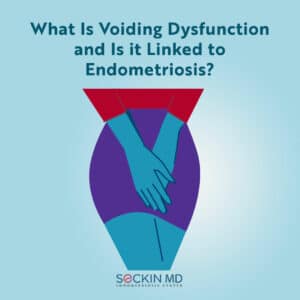What Is Voiding Dysfunction and Is it Linked to Endometriosis?

Voiding dysfunction refers to conditions in which the bladder does not function as the brain instructs and may occur following endometriosis surgery.
What are the types of voiding dysfunction?
There can be different types types of voiding dysfunction.
Overactive bladder (OAB)
OAB causes urinary incontinence and a need to urinate even when the bladder is not full.
Dysfunctional voiding
In this case, the bladder never fully empties. This leads to a sensation of urgency due to muscles controlling the flow of urine not relaxing completely.
Underactive bladder
This is a reduced frequency of urination due to weak bladder muscles that don’t respond to the brain. This can lead to overflow incontinence and require the bladder to be emptied via catheterization.
Does endometriosis affect the urinary tract?
Endometriosis can affect the urinary tract. Deep infiltrating endometriosis lesions can occur in the kidneys, ureters, urethra, and bladder. Nearly 50% of endometriosis in the ureter can be asymptomatic. However, lesions elsewhere in the urinary tract, which is a rarer occurrence, can result in symptoms such as pelvic pain, painful urination, blood in the urine, and urinary incontinence. Endometriosis of the ureters can cause similar symptoms as well.
In endometriosis, the severity of cardinal symptoms such as dysmenorrhea, gastrointestinal, dyspareunia abnormalities, painful bowel movement, and neuropathy can eclipse voiding dysfunction and other symptoms associated with muscles of the bladder.
How does endometriosis surgery impact voiding functions?
Peritoneal endometriosis is among the most prevalent forms of the disease. It affects the bowels, particularly the recto-sigmoid colon, sigmoid colon, cul-de-sac region, and appendix. Colorectal segmental resection or the removal of the bowel wall is a common surgical procedure to treat bowel endometriosis.
However, studies have shown that colorectal resection can result in voiding dysfunctions such as a hypoactive bladder in about 15 to 20% of the cases. This can increase to 30% when the uterosacral ligaments are also removed, which leads to changes in the rate of urine flow.
A systematic literature review showed that the presence of vesico-sphincteral symptoms in endometriosis patients can range from 3.4% to 15%. The study also showed that surgery for deep-infiltrating endometriosis (DIE) can actually promote urinary dysfunction incidences of up to 17.5%.
Another review showed colorectal surgical resection had a significant impact on postoperative voiding dysfunction compared to rectal shaving. Rectal shaving is a process of “shaving” endometriosis lesions in the rectum using a laser or scissors without having to open the bowel. The procedure does result in fewer voiding complications. However, the chances of some lesions remaining inside the rectum are high.
A single-center retrospective cohort study of 198 women who underwent surgery for DIE showed that postoperative voiding was frequent and was particularly high when the diameter of the removed lesion was greater than 3 cm.
Can laparoscopic deep excision surgery help prevent voiding dysfunction?
Laparoscopic deep excision surgery is the “gold standard” for endometriosis treatment. There are no definitive studies comparing voiding dysfunction in laparoscopic deep excision surgery vs. colorectal segment resection or rectum shaving. However, research has shown that laparoscopic hysterectomy has post-operative voiding consistent with normal voiding patterns.
In a multicenter study involving 5,162 women who had undergone laparoscopic excision of deep rectovaginal endometriosis lesions, significant reductions in voiding difficulty, frequency, and incomplete passing of urine and stool combined with increased quality of life were observed two years after the procedure.
At Seckin Endometriosis Center, we use our own innovations in laparoscopic deep excision such as Aqua Blue Contrast and cold excision to fully carve out the lesion.
Do you suffer from voiding dysfunction? Please share your experience by leaving a comment on our post on Facebook or Instagram if you wish.
Get a Second Opinion
Our endometriosis specialists are dedicated to providing patients with expert care. Whether you have been diagnosed or are looking to find a doctor, they are ready to help.Our office is located on 872 Fifth Avenue New York, NY 10065.
You may call us at (646) 960-3080 or have your case reviewed by clicking here.